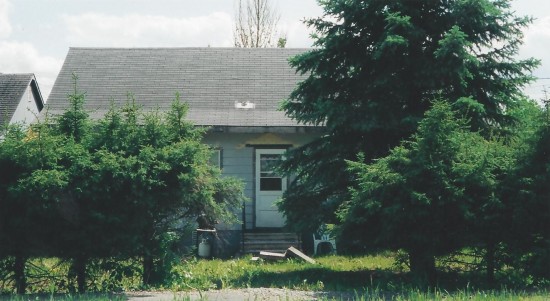Toys lie scattered over the yard like lead pellets from a shotgun. A bomb field – that is what my old childhood home looks like – or at least what the yard around it looks like. Twisting wild grass grows waist high in the space which was once occupied by a trim lawn. I can see bicycle shapes, lying derelict and abandoned, in the greenery. Coloured silhouettes peeking out of the weeds indicate that other long discarded playthings are slowly morphing into the landscape as well. I check my inner self for twinges, for depression, or grief, but find only indifference.
A large chunk of the hedge is missing but it gives me a better view of the house. It has seen better days. Much better days. Black stains on the siding give one the impression that the house is slowly being consumed by a malignant fungus. One window is broken and has been repaired with torn cardboard and duct tape. I briefly wonder at a garage door which stands where the front wall of the rec room once stood; then I return my gaze to the devastated hedge.
As bad as it is I know that my father would have been the only person to lament its destruction. He was quite proud of that border. I remember bumping along countless dirt roads with him as we searched for the perfect trees to complete the privet hedge. On one occasion we spotted a beauty up an embankment and his face lit up. He slammed on the brakes and grabbed his shovel then handed me the bucket; we hiked up the hill to inspect the specimen. I remember the look of pride on his face when it turned out to be exactly what he was looking for.
But today his ashes lie scattered down by the Namakan River, his atoms forever haunting the cool green woods that he loved the most, no longer vulnerable to the disappointment of a ravaged home.
Beads of sweat stand out on my forehead; the sweat runs down my face, my neck and my back making my shirt stick to my skin. I smell the fresh odour of cut grass and the rot of leaves as the hot, humid breezes blow in through the open windows of my rental. I cruise by my childhood home and see the neighbour mopping his forehead before swigging from a water bottle as he stands by a suddenly quiet lawnmower. I don’t recognize him. I do not recognize anyone. Too many years have gone by since I was last here.
I take a final look at the dilapidated house. I do not hear the echo of our childhood voices amongst the toys in their burial ground. No friendly spirits tarry in the shadows beckoning me in. I do not smell the lingering scents of my mother’s endless supply of fresh baked bread coming from the fetid house. I shed no tears for this unkempt house.
I roll up the windows and turn the air conditioner to high, then push down on the accelerator. The phrase “You can never go home again” flickers through my mind and I realize the flaw of that statement. Home isn’t a point on a map; it isn’t an address, or a building. Home is the memories, the feelings, the love I carry in my heart. I know that as long as I have those I will always be able to go home.
Image Credit
Photo property of Gab Halasz



So touching and true.
As long as the house is still there, a new owner could restore it. One of my childhood homes was razed to make way for a concrete bunker that served as the master heating system for an expanding hospital, which a few years later moved across town anyway, leaving a neighborhood full of ugly utilitarian empty medical buildings in its wake. This is somehow emblematic of what I have seen happen in the community in which I grew up, and I’m feeling more and more as if home and community only have existence on the spiritual plane.
Bang on and perfect!! What a fantastic trip through memory lane with a relatable piece such as this.
Excellent – very poignant and so true.
Yahuh.